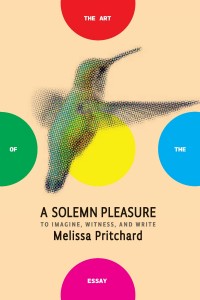Book Review
 Melissa Pritchard has an intriguing, transcendent vision of writing. This is readily apparent in A Solemn Pleasure—a spirited, intelligent, wide-ranging exploration of the joys, frustrations, and trials of the life of the writer. She has grand goals for writing and does not shy away from sharing her lofty vision. Pritchard’s essays examine the highs and lows of the writer’s life—with a particular emphasis on writing’s ability to both describe and transcend its subject matter.
Melissa Pritchard has an intriguing, transcendent vision of writing. This is readily apparent in A Solemn Pleasure—a spirited, intelligent, wide-ranging exploration of the joys, frustrations, and trials of the life of the writer. She has grand goals for writing and does not shy away from sharing her lofty vision. Pritchard’s essays examine the highs and lows of the writer’s life—with a particular emphasis on writing’s ability to both describe and transcend its subject matter.
Although this sounds esoteric, Pritchard is extremely clear about her subject. Her essay “Spirit and Vision” explores the deep under-layer of a writer’s loneliness—the very place where writing becomes possible. Here, the guts of creativity—the hardscrabble work to create words on paper—are tied to a spiritual and religious view of the writer and her world. Pritchard holds writing as a privileged, religious calling. She reminds us that a writer’s “success” is not assured. In fact, she suggests that the world is against the writer’s vocation: “competition is fierce . . . from television, film, radio, all social media,” and most importantly, Americans have “an insidious numbness to literature.”
Pritchard tells us that despite writing’s spiritual importance, the world does not need the writer. Therefore the writer must learn “the detachment, charity, and humility essential to being immersed in one divine reality.” Writing requires a monkish attitude toward the outside world. The writer lives between the lonely, quiet self in touch with the spirit of God and the inflexible demands of the world.
Pritchard stresses that writers should consider their craft “a perpetual form of perishing,” and she urges writers to “free yourself from attachments to awards, publications, praise, to indifference and misunderstanding.” Her sense of writing exists on a lofty plain—far from self-serving thoughts or motivations. Of course, this is a difficult program, and Pritchard is honest about this struggle. In the rest of her essays, she explores how this almost religious view of writing fares against harsh reality.
In her essay “From Deep South to Desert South: An Epiphytes Confession,” Pritchard laments the lack of regionalism in writing. In her early career, this absence of a strong sense of place inhibited her work. Only later did she view this as an asset: “I can claim the identity of the transient, the migrant, the epiphyte. I see that no place is still a firm place, and that displacement can be its own region.” This extraordinary statement is in keeping with her philosophy of compassionate detachment; it also takes a concept like place and throws it into delightful confusion—“no place” remains, in her world, “a firm place.” Writing must reach for something higher than regionalism—it must have the ability to grasp universal ideals.
Pritchard also uses writing to stop, even briefly, the flow of time. In her essay “Time and Biology: On the Threshold of the Sacred,” she dismantles the illusion of our time-bound, biological nature. She explains that time as “a medium through which we move . . . is an illusion we feel most ensnared by.” Our “second immutable restriction, a grand scale injustice, can be found in biology.” In a sense, our time-bound bodies trap us—but for Pritchard, the writer can surmount that obstacle with “the gift of anonymity.” Anonymity is the “setting aside of the socialized . . . self in order to better connect with humanity in one’s art.” Pritchard holds that this is achieved through the writer’s sense of suffering and compassion that allows a writer to imagine other people’s lives. This gives writers the ability to “find the courage to move beyond the illusion of separation and exile and become the architects of the vast, collective soul.”
Pritchard’s passionate portrayal of writing as a spiritual and religious exercise continues throughout A Solemn Pleasure, but she does not linger in theory. In an essay titled “Finding Ashton,” Pritchard travels to Afghanistan to interview female soldiers. In the process, she runs aground on the concrete reality of senseless loss. In “Still, God Helps You,” Pritchard befriends a Sudanese man who was kept in slavery since childhood and confronts the anxiety and promise of true compassion.
As deeply as Pritchard is committed to the spiritual element in writing, she perhaps unintentionally reveals a more primitive connection to the written word in “On Bibliomancy.” Here, she explores “[b]ibliophage…a rare disorder wherein the afflicted person compulsively eats books.” For such individuals, symptoms include “feelings of relief upon eating books, and a reduction of anxiety brought about by eating books.” That Pritchard ends her collection with an exploration of this disease is informative. Resting comfortably alongside writing’s transcendent status is the simple yearning for comfort and connection from the books we read. Pritchard seems to be telling us that reading a book is like eating a bar of chocolate: it relieves our anxiety and fear and provides simple pleasures—even if only briefly.
Pritchard’s essays inhabit the ground where spirit struggles with the world. Her essays show us that writing can have an astonishing range of motivations, goals, and outcomes. It can both ground us in simple earthy comforts and enable us to soar to lofty realms—but mostly it provides simple, affirming joy.
About the Reviewer
Eric Maroney has published two books of nonfiction and numerous short stories. He has an MA in philosophy from Boston University. He lives in Ithaca, New York, with his wife and two children and is currently at work on a book on Jewish religious recluses, a novel and short stories.